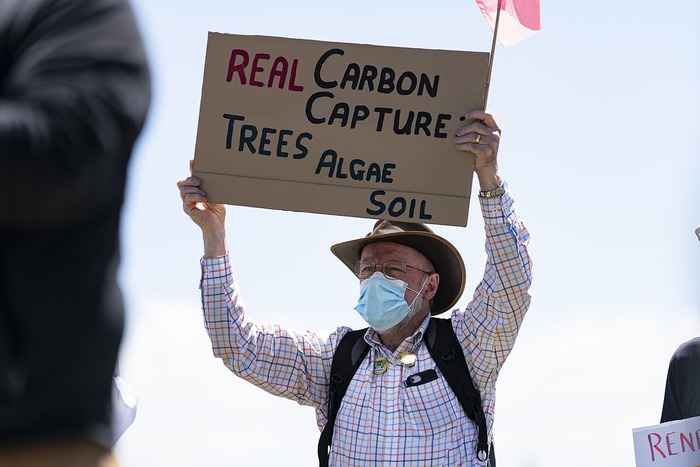
Carbon capture, utilisation, and storage (CCUS) technologies are often criticized for being expensive and challenging to implement at scale.
However, achieving net-zero emissions is considered "virtually impossible" without them, as noted by the International Energy Agency (IEA).
Among these technologies, biomineralisation has emerged as a promising, eco-friendly approach.
>> RELATED: DOE Invests $100 Million for Pilot-Scale Carbon Conversion

Understanding Biomineralisation
Biomineralisation is a natural process where dissolved inorganic carbon reacts with mineral cations like calcium (Ca²⁺) and magnesium (Mg²⁺) to form stable carbonate minerals.
This process mimics the way marine organisms such as corals and mollusks build their exoskeletons by absorbing CO2 from ocean water.
The study, titled "Biomimetic mineralisation for carbon capture and sequestration," highlights how this method could contribute significantly to sustainable carbon sequestration.
Marine organisms produce an estimated 5 billion tons of calcium carbonate annually, with 60% accumulating in sediments.
This equates to around 1.4 billion tons of CO2 stored in the ocean each year, roughly 5% of global annual emissions from fossil fuels and industrial activities.
Why Biomineralisation Stands Out
Traditional carbon sequestration methods like deep-ground injection, ocean storage, and enhanced oil recovery (EOR) have significant drawbacks.
Deep-ground injection depends on specific geological conditions and risks leakage due to seismic activity. Ocean storage can lead to acidification, harming marine ecosystems.
EOR poses challenges in preventing CO2 leakage and ensuring long-term stability.
In contrast, biomineralisation offers a safer and more sustainable alternative. This method turns CO2 into solid rocks, minimizing the risk of it escaping back into the atmosphere.
Additionally, biomineralisation relies on biomolecules processed through natural chemical reactions, reducing environmental impacts compared to physicochemical methods that consume significant chemicals and energy.

>> In Other News: Hydrogen Equipment Pioneer H2SITE Successfully Raises EUR36 Million From a Consortium of Investors Co-led by Hy24 and SC Net Zero Ventures
Advantages of Biomineralisation
Eco-Friendly and Sustainable Biomineralisation requires minimal energy input and operates under ambient conditions. It’s effective across various environments and avoids the adverse environmental effects of traditional methods.
Low-Cost Approach The process has lower chemical and operational costs and better control over reaction conditions, making it a potentially affordable solution for carbon sequestration.
Abundant Resources Mineral cations necessary for the process are readily available in ocean water and industrial waste, further enhancing its sustainability.
DR. ELLEN KAY, one of the researchers behind the study, emphasized, “Biomineralisation is not just a method; it’s nature’s own blueprint for sustainable carbon storage.”
Challenges to Overcome
While biomineralisation holds promise, several hurdles remain:
Scaling UpThe technology is currently limited to laboratory-scale experiments. Scaling it for widespread use requires further testing to establish economic viability.
Recycling Limitations Once carbonate minerals form, the CO2 is permanently locked within. This prevents recycling and necessitates continuous production of new biocatalysts, which could raise costs.
Operational Feasibility Deploying this method on a mass scale requires innovative solutions to reduce costs and streamline the use of biocatalysts.
DR. RICHARD EVANS, another key researcher, noted, “Biomineralisation is a low-cost, eco-friendly CCUS technology, but we need to address its scalability to make it a viable global solution.”
Future Potential of Biomineralisation
Despite the challenges, biomineralisation could revolutionize carbon storage. By leveraging abundant resources like industrial waste and ocean water, this method could become a cornerstone of eco-friendly carbon sequestration.
Researchers believe that continued investment in this technology could help overcome its limitations, paving the way for a scalable solution.
The study’s findings suggest that biomineralisation offers better control over reaction conditions and robustness across different environments. These qualities make it an attractive alternative to existing carbon capture methods.
Final Thoughts
Biomineralisation represents a significant step forward in the quest for sustainable carbon storage. By mimicking natural processes, this method minimizes environmental harm while offering a safer alternative to traditional carbon sequestration techniques.
While challenges remain, ongoing research and innovation could unlock its full potential, making it a game-changer in the fight against climate change.
Subscribe to the newsletter
Daily decarbonization data and news delivered to your inbox
Follow the money flow of climate, technology, and energy investments to uncover new opportunities and jobs.
Latest issues
-
Cummins Quit Electrolyzers. Electric Hydrogen Didn't.
Inside This Issue ⚡ Cummins Quit Electrolyzers. Electric Hydrogen Didn't. 🧪 New Electrified Method Captures Carbon Dioxide From Air 🌾 Iowa Could Be on the Cusp of a Hydrogen Rush; Lawmakers Weigh ...
-
Inside America’s Carbon Capture Reality Check
Inside This Issue ⚡ Duke Energy Florida Goes Live With First 100% Hydrogen System ✈️ Air bp Signs Agreement With Airbus on Flight Services and Fuel Supplies in Europe 🌊 Pairing Reefs and Mangroves...
-
Three Nebraska Plants Prove Ethanol CCS Actually Works
Inside this Issue 🌽 Three Nebraska Plants Prove Ethanol CCS Actually Works ☀️ SunHydrogen and CTF Solar Sign Agreement to Accelerate Hydrogen Panel Manufacturing 🧪 GenH2 Completes Major Milestone:...
Company Announcements
-
• The long-term contract guarantees operational readiness and enables the start of construction in the second quarter of 2026 • The project positions Mexico as a reliable supplier of ultra-low car...
-
Funding accelerates commercial deployment of Utility's H2Gen® technology, which produces cost-effective clean hydrogen and highly concentrated CO₂ streams, enabling at-scale economic decarbonizatio...
-
A Firm Capturing Carbon at NYC High-Rises Tackles Canadian Gas Pipelines
CarbonQuest’s new project cutting emissions from an engine along a gas pipeline could help it scale to applications at universities, AI data centers, and factories. Startup CarbonQuest already pro...
-
Nova Scotia’s CarbonRun Reaches Carbon Capture Milestone With ‘River Liming’ Project
HALIFAX — A Nova Scotia-based company has accomplished a milestone in the world of carbon capture, with its project to store carbon dioxide in rivers using limestone. CarbonRun, co-founded by Dalh...